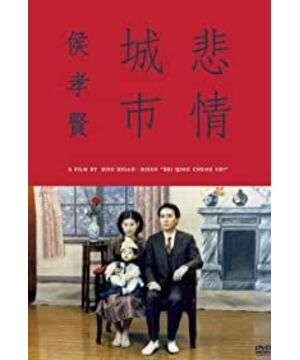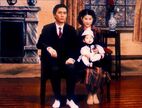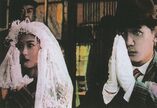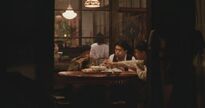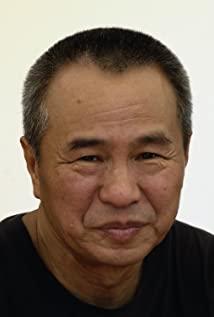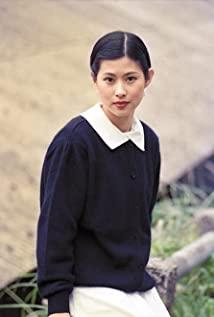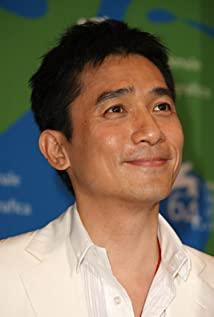Hou Hsiao-hsien's "City of Sadness", in the grand soundtrack of the thinker, tells the story of the family changing with the times in Keelung, Taiwan. In the night, Lin Wenxiong, the son of the Lin family, had a son. Just when the Japanese army surrendered, Wenxiong named Lin Guangming, symbolizing a bright future. Calling, lighting the lamp, Wenxiong narrowed his eyes, thinking that the hard days were over. Later, Wenxiong was framed as a traitor and hid in the old house. He couldn't see clearly. He turned on the lights during the day, and the lights flickered. Lin Xiong rubbed his eyes and said, "I often have nightmares recently." . The span of these two periods of time is not long, but the famous "228", martial law and other major political events have been sandwiched between them. It may seem hard, but at least the family is still there. The family is still there, and there are always people at the Lin family's dinner table, which is very lively. Later, erhu and song girls were also added in, which means "the end of the world song girl". Sadness and joy came from here, but the people in the room were indifferent. If you can endure it, you will endure it. There is no friendship left between people, and who will tell the truth. Only one family was left alive, and the pain had to be told to someone, so they had to swallow it themselves. They scolded President Chen Yi in their mouths, but they were still helpless. That kind of life is not up to him, just live a good life. In fact, what the people ask for is not much, one meter and one salt, a stable life, that's all. Regrettably, the political situation was unable to fulfill these small demands.
Whether it is the eldest son Lin Wenxiong, or Wenliang or Wenqing, for the family, there is always some desire to escape. Wenxiong is short-tempered and always has some dissatisfaction with his family. He is preached by Laozi. The stall he runs is suffering from being unable to get up or down. He has to take care of Wenliang and the deaf and mute A Qing. Raising your hand is killing someone with a machete. It is not arbitrary. If something goes wrong at home, he has to carry it. In the end, it was his character that killed him. At his funeral, accompanied by the grief and joy he insulted during his lifetime, a basket of black-and-white portraits was lost beside the incense. Hou Hsiao-hsien did not give the following, which is regarded as giving a family enough respect. But the emotion of forbearance is the most capable of reaching people's hearts. A Liang was half crazy, and he would make trouble at every turn to the point of seeing blood. His hostility, his ruffian spirit, was the heaviest among the three brothers. The old father positioned himself as a hooligan, but always warned Wenliang that hooligans also have hooligan rules. Wenliang is like a knife, piercing everyone's love-seeking hypocrisy in front of interests one by one. This is the easiest and most direct way. He came down from the battlefield and turned the town into another battlefield. When he fell ill, he would always talk to himself in the room where the gods were being offered. The people in the foreground and the world they were talking about had nothing to do with him. When he woke up, he was full of scars. The cruelty made him unable to come back. And the deaf and mute Wen Qing, even though he lives in a photo studio like a paradise, with his loved ones wide and beautiful, accompanied by his friends Principal Lin, Wu Rongrong and others, he is still involved because of their "intellectuals" into the center of the political struggle. Wen Qing was always a bystander in the movie Yi, but many things were decided by no one, and he had to force him to Liangshan: the photos before leaving, the European-style buildings in the background, represent all the false prosperity. Since he left, only Kuan Mei has spoken, thinking about the stack of words. The second child is a doctor in Nanyang, and his life and death are still unknown. In the end, the only male in the family was Wen Liang who was half crazy and half stupid. In those days, if you want to live, you have to pretend to be crazy and foolish, and you have to be grandstanding. On the other hand, those who can escape political persecution, except the old and weak, are basically lunatics.
The people wanted to cry out for these oppressions, but they couldn't. Compared with other works of Hou Hsiao-hsien, the soundtracks tailored by The Thinker for the film have significantly increased the number of scenes, either lyrical or out of context, which is rare in Hou Hsiao-hsien's films. In addition, the "September 18" sung by the progressive youth is aimed at the rural mainland. The sadness of the erhu singer tells the sadness of life in the lobby of Lin's house, which also indicates the ending of that era and that family. Sad, until the end, the simple theme song was also changed from Erhu La play, which is really desolate. As for Kuanmei's diary narration, her emotions are helpless and her voice is lowered, but she always has a longing for the future. It is a pity that after the end of the Anti-Japanese War, they all thought that the good days were coming, but the good days, why did they disappear. This made Kuanmei's diary always full of helplessness about the world, but after going through all this, she was strong, the so-called sad but not sad, probably so. However, there is also the sound source of the Annunciation, which comes from government broadcasts. There are not only the announcement of the victory of the Anti-Japanese War, but also the speech of Chen Yi after the "February 28" incident. These and the folk scenes presented in the film have a strong irony. That is, this "happiness" has increased the "sorrow" of people's livelihood.
Hou Hsiao-hsien continued his high-level author style in this work. The precise scene scheduling lies in the strict three-point composition, the combination of the front, middle and back scenes and the flexible use of props, such as the curtains in front of the door, such as a transparent room, and Such as window frames for ingesting people, and so on. When they were formed, they were as rigorous as a history book, saying that history seeks mastery, and under the observation of the camera that is steady and distanced, the family goes to mourning. At the same time, when dealing with violent scenes, Hou Hsiao-hsien does not directly show violence, but looks directly at the consequences of violence, which is more critical than showing violence in a normal way. People have to bear all the consequences of violence, whether it is physical or Physically and mentally, it will be miserable.
Fortunately, the so-called sad city, the sadness here, always gives people a clear object of accusation. There are always expectations in life. Those who have experienced hardships can always find hope for the future at the most painful moment. Even if the illusion brought by the future defeats people's expectations again and again, it does not hinder people. They always find a reason for themselves to live. The contemporary Yang Dechang's "Kidling Street" did not, which made the audience feel heavier in comparison.
Therefore, you have to warn yourself, no matter if the weather is cold or the ground is frozen, or the horse is dead on the road. People, always have to find some hope for themselves and try to live, it is better than nothing at all.
View more about A City of Sadness reviews


